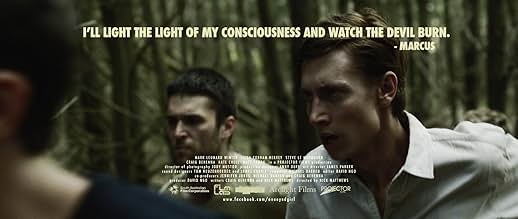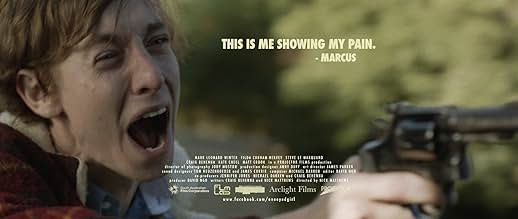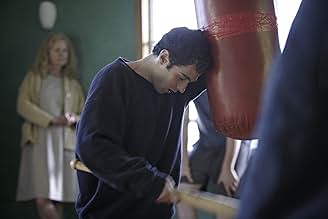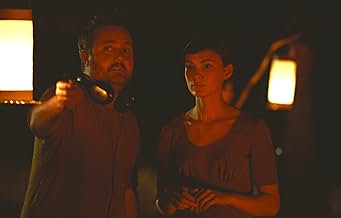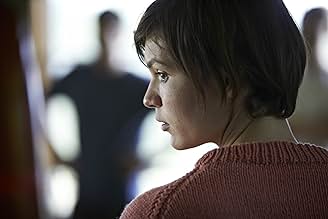Ajouter une intrigue dans votre langueA young psychiatrist is haunted by the suicide of a patient and hovers on the verge of a breakdown. He meets an attractive representative of a secret church that promises salvation to its me... Tout lireA young psychiatrist is haunted by the suicide of a patient and hovers on the verge of a breakdown. He meets an attractive representative of a secret church that promises salvation to its members.A young psychiatrist is haunted by the suicide of a patient and hovers on the verge of a breakdown. He meets an attractive representative of a secret church that promises salvation to its members.
- Réalisation
- Scénario
- Casting principal
- Récompenses
- 2 victoires et 1 nomination au total
Kate Cheel
- Rachel
- (as Katy Cheel)
Adom Carter
- Train Commuter
- (as Adom Kartor)
Adrian Gruszka
- Commuter
- (non crédité)
Emily McMahon
- Commuter
- (non crédité)
Avis à la une
I have to agree with one of the other reviewers that there isn't much, if anything, to recommend this by-the-books cult drama.
We have a chemically-dependent, terminally depressed young shrink (played convincingly enough by Mark Leonard Winter) whose young patient's suicide drives him over the edge, leading him into a cult-like EST-ish back-to-nature group led by Father Jay (Steve le Marquand).
Father Jay's group is all about getting "clear" (sound familiar?) and uses various punishing physical and mental techniques to supposedly "heal the soul".
So... is there anything you've heard so far that leads you to believe this is unlike any other cult you've heard about before?
Nope, didn't think so. And there isn't. I guess this might be shocking material for those who've never heard of brainwashing or even Charlie Manson, but it's snooze-inducing for those of us who have.
It's a pity because this isn't a poorly made film. The acting is decent. It just revolves around a non-story that's ordinary and non-compelling, to be kind. It's only 103 minutes, but it feels like a century. What a complete waste of everyone's time, including ours.
We have a chemically-dependent, terminally depressed young shrink (played convincingly enough by Mark Leonard Winter) whose young patient's suicide drives him over the edge, leading him into a cult-like EST-ish back-to-nature group led by Father Jay (Steve le Marquand).
Father Jay's group is all about getting "clear" (sound familiar?) and uses various punishing physical and mental techniques to supposedly "heal the soul".
So... is there anything you've heard so far that leads you to believe this is unlike any other cult you've heard about before?
Nope, didn't think so. And there isn't. I guess this might be shocking material for those who've never heard of brainwashing or even Charlie Manson, but it's snooze-inducing for those of us who have.
It's a pity because this isn't a poorly made film. The acting is decent. It just revolves around a non-story that's ordinary and non-compelling, to be kind. It's only 103 minutes, but it feels like a century. What a complete waste of everyone's time, including ours.
Beautiful Sorrow is a deeply emotional film that lingers in your heart long after the credits roll. It tells the story of love, loss, and the resilience of the human spirit, capturing the raw essence of grief in a way that feels profoundly real.
The film's lead actor delivers a breathtaking performance, portraying the protagonist's pain and longing with such authenticity that it's impossible not to feel their anguish. The cinematography is equally stunning, using muted colors and lingering shots to emphasize the weight of the emotions. The soundtrack-soft, melancholic piano melodies-only amplifies the film's heartbreaking atmosphere.
While A Beautiful Sorrow is undeniably heavy, it never feels manipulative. Instead, it allows the audience to sit with the sadness, to reflect on their own experiences with loss, and to appreciate the fleeting beauty of life. It's a film that doesn't just make you cry; it makes you feel.
If you're looking for a deeply moving experience, this film is a must-watch. Just be sure to have a box of tissues nearby.
The film's lead actor delivers a breathtaking performance, portraying the protagonist's pain and longing with such authenticity that it's impossible not to feel their anguish. The cinematography is equally stunning, using muted colors and lingering shots to emphasize the weight of the emotions. The soundtrack-soft, melancholic piano melodies-only amplifies the film's heartbreaking atmosphere.
While A Beautiful Sorrow is undeniably heavy, it never feels manipulative. Instead, it allows the audience to sit with the sadness, to reflect on their own experiences with loss, and to appreciate the fleeting beauty of life. It's a film that doesn't just make you cry; it makes you feel.
If you're looking for a deeply moving experience, this film is a must-watch. Just be sure to have a box of tissues nearby.
The film doesn't provide easy answers or fast-paced thrills. Instead, it offers a complex exploration of human suffering, the search for meaning, and the seductive power of belief systems. There are layers of tension that unfold quietly and methodically, making it feel more like a psychological investigation than a thriller in the conventional sense. While it may not boast the visceral impact of more overtly dramatic films in the genre, One Eyed Girl taps into a very real fear: the fear of losing control over one's own mind and identity.
What sets this film apart is its ability to balance character-driven drama with its philosophical and moral inquiries. The church that Travis stumbles upon isn't just a backdrop for the plot; it's a manifestation of Travis's fragile state of mind. Father Jay's influence over the group is subtle and insidious, and as we see Travis become more and more entangled with the church's practices, it's clear that the line between self-redemption and self-destruction is disturbingly thin.
What sets this film apart is its ability to balance character-driven drama with its philosophical and moral inquiries. The church that Travis stumbles upon isn't just a backdrop for the plot; it's a manifestation of Travis's fragile state of mind. Father Jay's influence over the group is subtle and insidious, and as we see Travis become more and more entangled with the church's practices, it's clear that the line between self-redemption and self-destruction is disturbingly thin.
I'm shocked at the negative reviews. I found this movie to be really powerful. Yes it's slow at first, but it's a beautiful story of self realization and triumph over internal suffering. The ending was a surprise and made the main character's transformation even more deep and real.
I swear I didn't dose off at in the first 45 minutes of this film, but it really seemed as though there were big gaping holes in the story. Really got tired of these tedious cult people forcing him to drink some gunk which he invariably upchucks. The story inched along, didn't pick up pace and left me feeling as though I was standing on a dark corner waiting for a ride at 3am. Would not recommend to anyone. Another of many Superchillin offerings that tout better than a 7.2 stars on IMDb, but when I actually come here, find it's a good 2 stars lower rated. 3 reviews are not a wide enough base to feasibly rate a film. The producer, director and main character could have logged on and given it rave reviews, but this was nothing close to the quality or content I would expect from a 7.2 star movie.
Le saviez-vous
- AnecdotesThe use of The Humming chorus from Madame Butterfly by Giacomo Puccini is a reference to Jennifer 8 that utilized the same track. The 90s Bruce Robinson thriller is a favorite of co-writers Nick Remy Matthews and Craig Behenna.
- Bandes originalesPretty Little Girl Of Mine
Written by The Yearlings
Performed by Chris Parkinson, Robyn Chalklin, Michael Darren, Naomi Tillett, Michael Green
Meilleurs choix
Connectez-vous pour évaluer et suivre la liste de favoris afin de recevoir des recommandations personnalisées
Détails
Box-office
- Budget
- 1 100 000 $AU (estimé)
- Durée1 heure 42 minutes
- Couleur
- Rapport de forme
- 2.35 : 1
Contribuer à cette page
Suggérer une modification ou ajouter du contenu manquant



